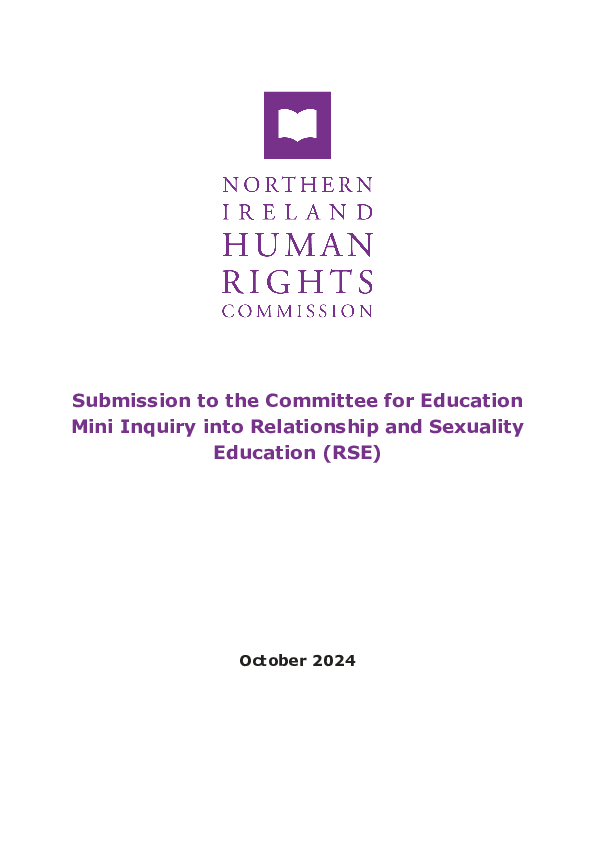NIHRC Submission to the Committee for Education Mini-Inquiry into Relationships and Sexuality Education
Date produced: October 2024
Below is a summary of the Northern Ireland Human Rights Commission's (NIHRC) recommendations and messages.
You can also download the full document through the links provided.
Summary recommendations
The NI Human Rights Commission recommends that:
2.10 RSE legislation, policy and guidance reflects international human rights standards by expressly articulating the fundamental right of children and young people to an education and to exercise agency and autonomy in the exercise of that right.
3.23 the Department of Education considers the recommendations from the UN CRC Committee and rulings from the ECtHR concerning the provision of withdrawal from relationships and sexuality education in NI.
3.24 in line with international human rights standards, the voice and evolving capacity of children and young people should be taken into consideration in developing RSE policy and children recognised as rights bearers. This should include opportunity and support for children and young people to make informed and independent decisions on withdrawal from RSE lessons, and to meaningfully contribute to that decision.
3.25 the Department of Education develops a strategy to raise awareness of the benefits of holistic RSE and to address any myths or misconceptions relating to the provision of RSE lessons that may increase the likelihood of parental withdrawal. Parents should be consulted to ensure their concerns and needs are understood.
3.26 the Department of Education develops measures to mitigate against the adverse impact of children and young people who are withdrawn from RSE lessons. For example, requiring schools to advise parents of the right of children and young people to education and participation; developing guidance on when children and young people may decide to opt back in to RSE lessons; and providing alternative educational arrangements for children and young people who have been withdrawn from RSE.
4.8 the Committee seeks clarification on the extent of the Department of Education’s duties under the 2023 Regulations.
4.9 the Department of Education clearly outlines the key elements that should be included within ‘comprehensive’ RSE. This should reflect international standards and achieve the aim of ensuring that all elements of comprehensive RSE are delivered within every post-primary school in NI.
5.5 schools include students in co-developing and evaluating RSE policies to ensure they meet the needs of young people.
6.3 RSE resources are regularly reviewed to ensure they meet the needs of young people and the requirements set out in international human rights standards.
7.7 the Department of Education engage with teachers to invite their views on the supports they require to enable them to competently deliver RSE to post primary school children.
7.8 the Department of Education engage with the teacher training colleges in Northern Ireland to ensure their programmes adequately educate newly qualified teachers in the provision of RSE. The Department of Education NI should also consider arrangements for the continuing professional development of members of the teaching profession, to ensure they are trained in the delivery of comprehensive, scientifically accurate RSE.
7.9 the Department of Education NI develop additional guidance for schools on how to establish effective partnerships with external RSE providers. This should include guidance on ensuring that programmes and resources are compliant with international human rights standards.
8.8 in line with pre-existing arrangements, the ETI monitors the delivery of comprehensive RSE.
8.9 the RSE curriculum and statutory guidance are regularly evaluated and revised by the Department of Education NI to ensure that they are accurate, human rights compliant, and adapting to emerging needs.
8.10 the Department of Education collects data on the number of children and young people withdrawn from RSE lessons, including the reason for their withdrawal. Data should be disaggregated to determine whether any specific groups are disproportionately impacted by the provision for opt-outs. For example, by age, disability, ethnicity, religion and sex.
9.3 guidance and any further reforms are developed following engagement with relevant stakeholders and experts to ensure that RSE programmes are inclusive and meet the educational needs of all students including, but not limited to, disabled students, ethnic minority students, and those with diverse gender and sexual identities.
10.11 the RSE curriculum includes violence against women and girls as a mandatory component and that it reflects international standards.

Download Documents
Your browser is out-of-date!
Update your browser to view this website correctly. Update my browser now